My top five veges for beginner gardeners in the sub-tropics
I wrote this post when I had only been gardening for about 3 years, but these are still my favourite vegetables to grow. They are easy to grow and produce a good crop. This is a list of my top 5 favourites for beginners in a sub-tropical climate:
1. Silverbeet
This is a surprising one, as I never ate it before I had a garden, but it was the thing I missed the most when we first moved house and I had no garden for a few months. Once established, silverbeet keeps going for months (in this climate anyway). We usually have about six mature plants in the garden at a time, which provides a couple of leaves for our dinner each night and extra as a treat for the chickens. Even when veges in the supermarket are between seasons and expensive, we can always top up a meal with a few leaves of silverbeet.
2. Cherry Tomatoes
While the large tomatoes have proven to be delicate, disease-prone and attacked by fruit fly, the little cherry tomatoes have had no such trouble. They just keep going no matter what! In the last garden we had one large rambling plant that I tried to contain in a circle of mesh, but it was always escaping. Now I have a small, well-controlled plant in a pot and get heaps of tiny tomatoes from it all year. The extras go into the freezer whole and get thrown into stews and pasta sauces. In the last garden I had cherry tomatoes coming up all around the garden from the rotten fruit that I didn't get a chance to pick, so they are very easy to cultivate.
3. Poor Man's Beans (Dolichos Lablab)
I don't think you can even buy this one in the shops. Its a large climbing bean that seems to keep growing for years, dying back in winter and returning in spring. Mine is currently covered in beans. The string beans growing next to the Poor Man's are in poor condition this year, destroyed by slugs, but the Poor Man's seems more hardy. The current plant was grown from seeds saved from the last garden, so its easy to cultivate too. Between the beans and the sliver beet, we always have something green for dinner!
4. Spring Onions
I have tried and failed to grow normal onions, however I have never had any trouble with spring onions. We have them in the garden all year and pick as needed. When they get big they grow seed heads, which I just cut off when they are ready and the onion is still ok to eat later. The next crop is then easily grown from this seed, so you have onions forever!
5 Cos-type Lettuce
My mother-in-law gave me some lettuce seeds for our first garden, so I don't even know exactly what type they are, but they are perfectly suited to hot and humid conditions. They are a non-hearting Cos-type lettuce. The best part is that the seedlings some up within a couple of days of planting and you literally get hundreds in a pot, so they are very easy to cultivate and there's plenty for the chickens too, this is very encouraging for the beginner! They go to seed after a while, but that's just more seed for the next crop.
Any suggestions for other fail-save crops for beginners? The ones I have chosen are disease resistant, easy to cultivate and cheap as you can save seeds from each crop (except my silver beet has never gone to seed!).
2016 update: I have to add kale to the list. It is about the only vegetable that will grow through heat-waves and frost conditions. I have several plants that have been in the garden for years. I sometimes flowers and seeds, but always regrows more leaves. Its great cooked and can be used raw in salad as well.
More on seed-saving and my garden.
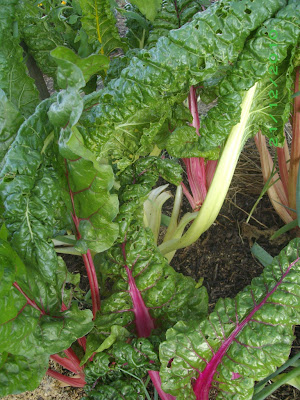 |
This is a surprising one, as I never ate it before I had a garden, but it was the thing I missed the most when we first moved house and I had no garden for a few months. Once established, silverbeet keeps going for months (in this climate anyway). We usually have about six mature plants in the garden at a time, which provides a couple of leaves for our dinner each night and extra as a treat for the chickens. Even when veges in the supermarket are between seasons and expensive, we can always top up a meal with a few leaves of silverbeet.
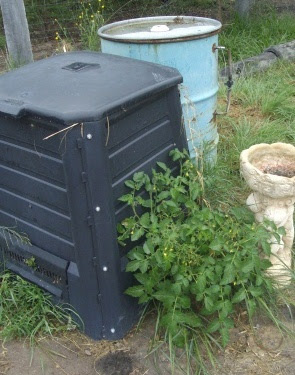 |
| This cherry tomato is growing out of my compost bin |
2. Cherry Tomatoes
While the large tomatoes have proven to be delicate, disease-prone and attacked by fruit fly, the little cherry tomatoes have had no such trouble. They just keep going no matter what! In the last garden we had one large rambling plant that I tried to contain in a circle of mesh, but it was always escaping. Now I have a small, well-controlled plant in a pot and get heaps of tiny tomatoes from it all year. The extras go into the freezer whole and get thrown into stews and pasta sauces. In the last garden I had cherry tomatoes coming up all around the garden from the rotten fruit that I didn't get a chance to pick, so they are very easy to cultivate.
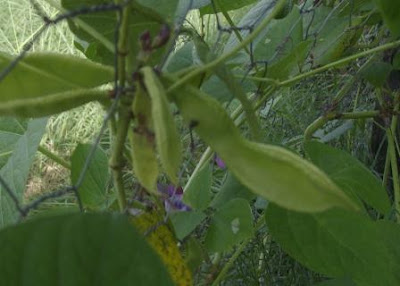 |
| Poor Man's Beans can grow up to 10cm long if you don't find them in time! |
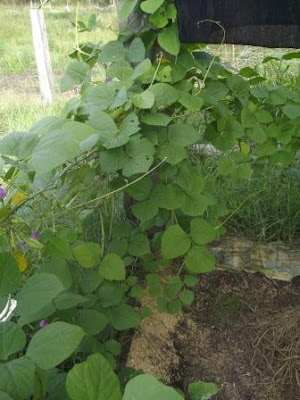 |
| Poor Man's Beans are easy to grow and produce lots of beans. |
I don't think you can even buy this one in the shops. Its a large climbing bean that seems to keep growing for years, dying back in winter and returning in spring. Mine is currently covered in beans. The string beans growing next to the Poor Man's are in poor condition this year, destroyed by slugs, but the Poor Man's seems more hardy. The current plant was grown from seeds saved from the last garden, so its easy to cultivate too. Between the beans and the sliver beet, we always have something green for dinner!
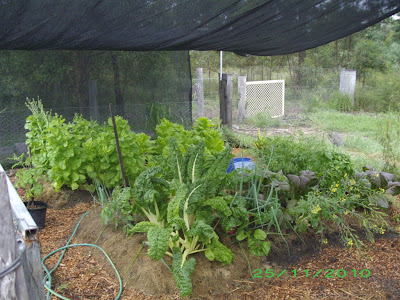 |
| Spring onions are planted between other veges, the lettuce is the in background (starting to seed) |
I have tried and failed to grow normal onions, however I have never had any trouble with spring onions. We have them in the garden all year and pick as needed. When they get big they grow seed heads, which I just cut off when they are ready and the onion is still ok to eat later. The next crop is then easily grown from this seed, so you have onions forever!
5 Cos-type Lettuce
My mother-in-law gave me some lettuce seeds for our first garden, so I don't even know exactly what type they are, but they are perfectly suited to hot and humid conditions. They are a non-hearting Cos-type lettuce. The best part is that the seedlings some up within a couple of days of planting and you literally get hundreds in a pot, so they are very easy to cultivate and there's plenty for the chickens too, this is very encouraging for the beginner! They go to seed after a while, but that's just more seed for the next crop.
Any suggestions for other fail-save crops for beginners? The ones I have chosen are disease resistant, easy to cultivate and cheap as you can save seeds from each crop (except my silver beet has never gone to seed!).
2016 update: I have to add kale to the list. It is about the only vegetable that will grow through heat-waves and frost conditions. I have several plants that have been in the garden for years. I sometimes flowers and seeds, but always regrows more leaves. Its great cooked and can be used raw in salad as well.
More on seed-saving and my garden.
















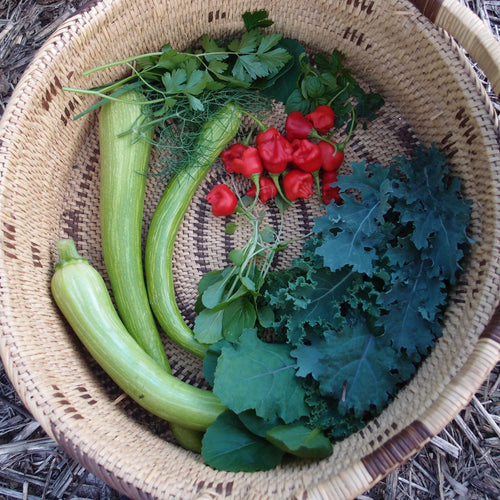

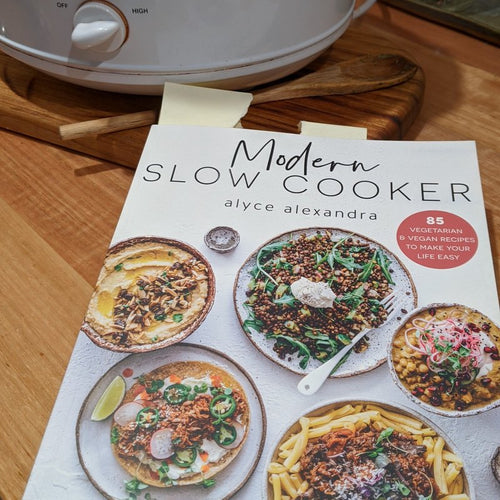

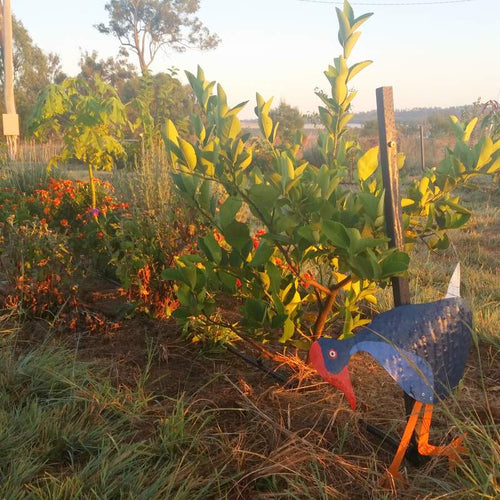




Leave a comment